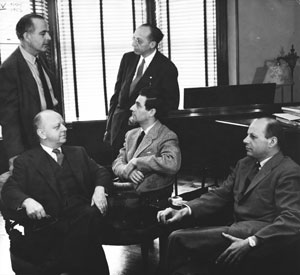Written by Harry Clark
Music by Copland, Thomson, Gershwin, Barber, Bernstein
1M: Virgil Thomson
2M: pianist and cellist OR pianist and violinist
3M: pianist, singer and cellist
“Aaron Copland’s music is American in rhythm, Jewish in melody, eclectic in all the rest. The subject matter is limited but deeply felt. Its emotional origin is seldom gay, rarely amorous, almost invariably religious. Today we ape Stravinsky. Yesterday it was Debussy. Before, it was Wagner. Copland’s best recommendation is that he is less eclectic than his confreres. I reproach him with the eclecticism all the same.”
Virgil Thomson, from Modern Music 1932
“Dear Virg, Thanks for the article in Modern Music. All my friends thought it very swell. It made me understand your music much better. And it will help me make mine better, I hope. Yours, Aaron”
The year 2000 was a bonanza for Aaron Copland devotees with performances, festivals, symposia galore, all celebrating the dean of American composers. There is nothing like a centennial to make the musical establishment go crazy. I had been requested by several organizations to create a Copland work but felt uncomfortable portraying Copland as Copland. It would be caricature, and besides, I most often get inside a character by recollections or parallel remembrances of someone close by. Virgil Thomson fit the bill perfectly. As critic of New York’s Herald Tribune, Virgil Thomson presided over the American musical panorama with his acerbic and brilliant writing about composers, performers and musical institutions in the mid 20th century. Thomson followed Copland to Paris to study with Madame Boulanger, but did not return to the states as Copland did to fight the good fight for American music. He remained in Paris, composed a great deal of music, and until the Nazis forced him out he commented about the American scene à la Gore Vidal. This bird’s eye view allowed him a clearer and not totally jaundiced view of the politics of American music.
Three distinctly different but engaging actors have brought the work to life—Philip Bosco, the late dear Mason Adams, and most recently Armin Shimerman. All American actors, all first-rate. As Virgil Thomson quipped when queried about what it was to be an American composer: Be born in America and then write anything you please.

